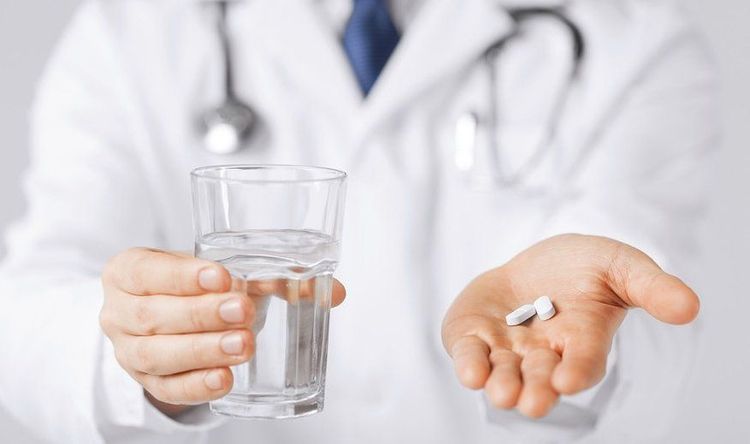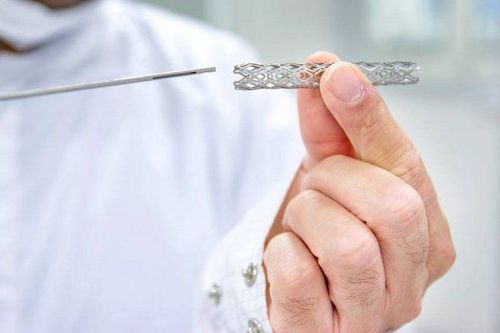This is an automatically translated article.
The article is professionally consulted by Master, Doctor Hoang Thi Hoa - Cardiologist - Department of Medical Examination and Internal Medicine - Vinmec Ha Long International General Hospital.Angina is a pain originating from the heart due to many different causes, but mainly due to atherosclerosis, coronary artery spasm... Treatment of angina aims to relieve pain quickly, limit fibrous plaques. More mortar accumulates, slows down the progression of the disease while reducing the risk of myocardial infarction for patients.
1. Treatment of angina with medicine
To treat angina pectoris, the patient will be prescribed drugs to help increase blood circulation in the coronary arteries, providing enough blood and oxygen for the heart muscle to function normally again. Specifically, the groups of drugs to treat angina include:
1.1 Nitrate drugs (glyceryl trinitrate, isosorbide dinitrate, isosorbide mononitrate) This group of drugs has vasodilating effects, increasing blood flow through the coronary arteries, helping the heart muscle to be supplied. enough blood and oxygen to function. Glyceryl trinitrate is a tablet that is placed under the tongue commonly used in the treatment of angina pectoris for patients. The patient will put the tablet under the tongue when chest pain occurs. Such a dose will provide rapid pain relief within a few minutes.

Trắc nghiệm: Sự thật về trái tim của bạn
Tim là 1 phần của hệ tuần hoàn, được cấu thành bởi tâm thất, tâm nhĩ, các van tim, động mạch và tĩnh mạch. Trái tim có chức năng lưu thông máu giàu oxy đưa tới khắp cơ thể. Được xem là "chìa khóa" của sự tồn tại nên việc giữ gìn một trái tim khỏe mạnh là rất quan trọng. Cùng tìm hiểu xem bạn đã thực sự hiểu về trái tim hay chưa.
Bài dịch từ: webmd.com
In addition, this drug is also produced in the form of a spray to carry around for more convenience.
When using this medicine, but the pain continues for more than 10 minutes, the patient should call an ambulance immediately to be taken to the hospital for timely emergency. Some side effects when using this medicine for angina is that the patient will have a headache for a short time, but then the condition will improve and disappear with continued use.
1.2 Statin drugs (lovastatin, simvastatin, atorvastatin...) Statin drugs work to lower blood cholesterol levels by blocking an enzyme necessary for cholesterol synthesis in the liver. At the same time, the drug prevents coronary atherosclerosis that causes angina pectoris.
There are different types of statin drugs, based on the appropriate prescription by the physician and the patient's choice of treatment.
1.3 Group of antiplatelet drugs (aspirin, clopidrogel, ticagrelor...) This group of drugs for angina pectoris has the effect of preventing the adhesion of platelets, enhancing and promoting blood circulation in the arteries. rim. When platelets stick together, they form a blood clot that narrows or blocks a blood vessel, causing angina. Therefore, aspirin works to solve angina attacks, effectively reducing myocardial infarction.
The dose of aspirin to treat angina is 75 mg/day, smaller than the dose in pain relievers, with few side effects. For patients with angina who are allergic to aspirin or have gastrointestinal diseases such as stomach and duodenal ulcers, they cannot use aspirin, but instead use Clopidrogel. Clopidrogel has the same effect of treating angina, helping to better protect the intestinal tract for patients.
1.4 Group of beta-blockers (atenolol, propanolol, bisopropol...) This group has the effect of slowing down the heart rate, relaxing blood vessels, significantly improving blood circulation in the coronary arteries. Beta-blockers also have a protective effect on the myocardium, reducing the risk of progression of angina complications.

1.5 Angiotensin enzyme (ACE) inhibitors (captopril, enalpril...) This is a group of drugs with vasodilator effects, increasing blood circulation, often indicated to treat angina pectoris for patients.
1.6 Group of calcium antagonists (nifedipine, amlodipine...) Also have the same effect as the above groups of drugs, calcium antagonists relax coronary arteries, enhance blood circulation to the heart, are commonly used in cure angina. The above are some of the main groups of drugs commonly prescribed in the treatment of angina. All of these drugs work well in preventing angina. The treating doctor may prescribe a combination of different drugs during treatment, to combine and complement each other's treatment. Taking medicine to treat angina should comply with the prescription prescribed by the treating doctor.
Trắc nghiệm: Huyết áp của bạn có đang thực sự tốt?
Huyết áp cao hay thấp đều ảnh hưởng đến tình trạng sức khỏe con người. Để biết tình trạng huyết áp của bạn có thực sự tốt không, hãy làm bài trắc nghiệm sau đây để đánh giá.2. Treatment of angina without drugs
In addition, the methods of angioplasty, coronary artery bypass surgery are also applied to treat angina without drugs. Patients can be treated with these methods if there is pain that is not controlled by medication or the location and severity of particular plaques, need to use this treatment method. and the aforementioned treatments are instantaneous. In order to effectively reduce the risk of angina attacks, as well as to prevent recurrence, the patient's diet, lifestyle and rest play an even more important role in the treatment of angina. Doctors recommend that people with angina should:Quit smoking. Keep blood pressure stable. Avoid overweight and obesity. Stabilize cholesterol. Exercise regularly, do sports suitable for health. Adjust healthy diet, should eat foods low in fat, monounsaturated, or polyunsaturated, eat lots of vegetables, do not eat fried foods, do not eat salty. Do not drink too much alcohol or stimulants. Periodic health check-up according to the appointment of the treating doctor. Use the right medication, on schedule. Thus, the treatment of angina will be highly effective if it is combined with drug treatment or surgery with lifestyle and diet adjustments.
Master. Hoang Thi Hoa has more than 10 years of experience in the field of Cardiology, especially in the field of cardiovascular emergency and echocardiography. Doctor Hoa used to be the Deputy Head of Cardiology Department of Quang Ninh General Hospital before working at Vinmec Ha Long International Hospital.
If you notice unusual health problems, you should visit and consult with a specialist.
Please dial HOTLINE for more information or register for an appointment HERE. Download MyVinmec app to make appointments faster and to manage your bookings easily.













